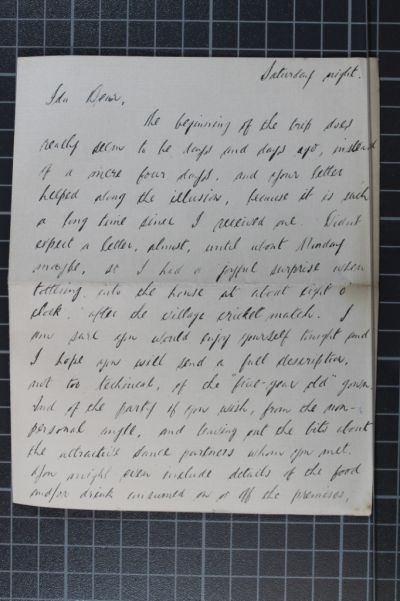
Michael recalls some of his NSM teachers.
I can illustrate two of the teachers by two little stories. They are both about going home on the bus, funnily enough. But one of them, a friend of mine had moved from school in Middleton to live in Chorlton and at that time you could get the 80 bus which went from Middleton to Chorlton and… I go an invitation to go and see them. So my mother agreed after my music lesson I… I wasn’t to go home, I was gonna get the 80 which you got outside the Cavendish church on Cavendish Street. And I went to the bus stop full of what I could do and everything, not fearing the world. And when I got to the bus stop I saw Ms Euerby coming up the road. And she came up to me and she stopped right by me and she said, ‘What are you doing here, Michael?’. She knew who I was. And I said, ‘Oh, well, Ms Euerby—‘ I told her what I told you: I’m going to St Werburghs Road, my friends moved from Middleton to St Werburghs Road. And she said, ‘Right’, she said, ‘Now, I’m going to tell you: On the south side of Manchester the bus stops are much further apart than they are in the north side. So when I get off the bus, you get up straight away and ride to the next stop on the platform’. And she talked to me all the way because she knew that I didn’t know that. And in Manchester with the old busses you get up as soon as the bus moves away from the stop and the conductor would ring the bell for you. You know, other towns they don’t do this. They wait until the bus stops and everybody has a mad rush for the door.
But that’s the thing. So— So, she said, ‘Now, don’t forget that’. And when she got up to get off, she said, ‘Right, off you go now. As soon as the bus moves, go to the platform’. And that—that was really Ms Euerby, that— You imagine that sort of mind— That’s detail, it’s care, it’s everything, and that’s who she was. And everybody that I knew who was taught by her would say the same.
Now the other one was Ms Brindley and Ms Brindley could appear quite frightening, having silenced a bunch of noisy children outside her room on a Saturday morning. And she could— She was very efficient, very busy, she stood no nonsense. And I— it must have been rag(?) week, I came out of the Northern and stood at All Saints, waiting for a bus and no bus came. And I mean you didn’t have to wait more than 30 seconds and a bus would be swarming down the road. So she came out and I had seen her on my bus before, once, so whether she had relations in Rochdale or she lived in Rochdale I don’t know. And she came over to the bus stop and she said, ‘Now, Michael’. See they all knew who I was.
And she said, ‘Now, Michael, how long have you been standing here?’ So I said, ‘Well, some time’, you know, ‘I don’t know’. And she said, ‘Well, this is ridiculous’. And she just left me at the pavement and she went and stood in the middle of the road and stopped a taxi. And made him turn around. And she said, ‘Right, get in’. So I got in this taxi and she said, ‘Right, Cannon Street’. And, you know, away we sped and she paid the taxi and everything then she said, ‘There, that’s better’. And—And that was Ms Brindley. Now that’s what these people were like: they were decision makers, they didn’t, sort of, you know, what’s the word… You know… no… No prevarication, you know, it had to be—the thing was done.
There was a job to do, right we’re gonna do it, which was the practical answer.
Part of the #NSM2020 project "A 20/20 Legacy: the centenary of the Northern School of Music" supported by the National Lottery Heritage Fund.













